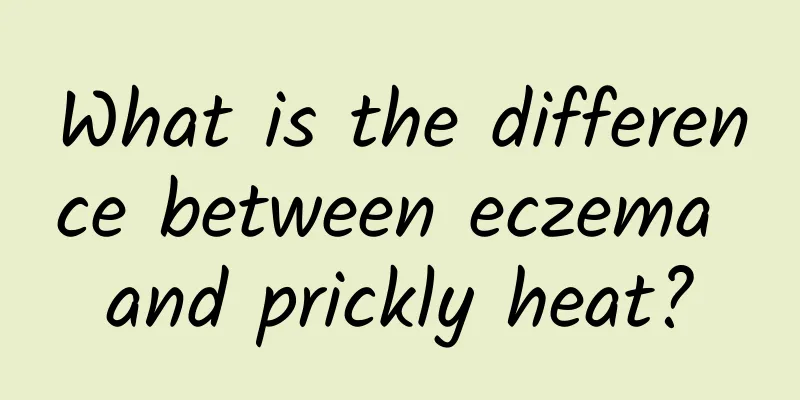What is the difference between eczema and prickly heat?

|
Summer is here, and eczema and prickly heat are becoming more common among people. Some people think that eczema is prickly heat, but is it really so? What is the difference between eczema and prickly heat? From the cause point of view: Eczema: There are many causes, most of which are related to allergies. For example, allergies to wool and other animal fur, pollen, and allergies to certain fruits such as mango. Heat rash: It is caused by blocked sweat pores. The sweat glands of infants and young children are not fully developed, and the skin barrier function of children is not as perfect as that of adults. In addition, they are very active, have poor sweating function, and have weak resistance to bacteria, which can easily cause sweat duct blockage and heat rash. From the perspective of the onset season: Eczema can occur in all seasons, but it is more serious in winter. As the temperature changes, the amount of eczema does not change much. However, prickly heat mainly occurs in summer. When the temperature is high, it is easy to get prickly heat. As the weather changes and the temperature gradually decreases, prickly heat will gradually disappear on its own. If your baby develops small bumps in winter, you should consider that it is eczema rather than prickly heat. From the perspective of the patient population: Eczema can occur in all genders, young and old. Prickly heat is more common in children, aged 1 to 5 years old, and relatively less common in children under 1 year old. From the perspective of disease onset: Eczema is diverse and symmetrically distributed; prickly heat can be divided into four categories: white prickly heat, red prickly heat, purulent prickly heat, and deep prickly heat. They are red papules or papule-like rashes the size of a needle tip, densely packed in patches. From the characteristics of the disease: Eczema causes exudation, itching, and is prone to recurrence; prickly heat causes no exudation but a hot, burning pain. As the temperature drops, the symptoms will gradually subside until they disappear. From the site of disease: Eczema mainly occurs on the baby's face, chest, and buttocks. The location of prickly heat varies according to the type. White prickly heat often occurs on the forehead, neck, trunk, and intertriginous areas; red prickly heat often occurs on the face and buttocks of children; purulent prickly heat often occurs on the flexor side of the limbs, intertriginous areas, and the head of children; deep prickly heat often occurs on the trunk and limbs. |
<<: What should men do if they have long pubic hair? Why?
>>: Can lithospermum officinale treat eczema? Is it effective?
Recommend
What are the causes of chronic prostatitis?
Prostatitis is the biggest problem that troubles ...
Why does my penis hurt after sex?
In modern life, people are gradually becoming mor...
Common male genital diseases
When it comes to sexual organ infection, many peo...
A must-read for good men: Things to note when your wife is having an abortion!
A wife's pregnancy is a good thing in itself,...
Why do men urinate frequently and painfully?
Frequent urination in men is one of the common ma...
The reason why you can't eat seafood when drinking beer, the taboos of drinking beer
When people drink beer, they often consider seafo...
Is it because of internal heat that boys have painful urination?
Since the male urethra and ejaculation opening ar...
What foods are good for kidney health and yang?
Many men suffer from physical weakness and illnes...
What is the treatment for chronic prostatitis?
Patients with chronic prostatitis are more diffic...
What are the advantages of a man having a big nose?
In the eyes of many people, the nose is an import...
What causes hernia in men?
The onset of hernia is the same for men and women...
How to remove beard for boys
Boys will grow beards after puberty. When they fi...
Can men eat donkey-hide gelatin?
As a common nutritional supplement in daily life,...
The best way to remove facial wrinkles
Many men think that wrinkle removal is a female s...
What is the best way for men to lift their buttocks?
The topic of buttocks lifting is not limited to w...









